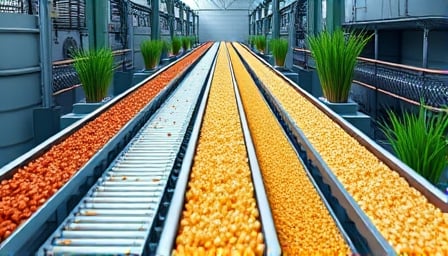Oat Market Shakes Up: Millow’s Revolutionary Plant-Based Protein Factory
In a groundbreaking move that could redefine the plant-based protein industry, the Swedish company Millow has officially launched the world’s first oat and mycelium factory dedicated to producing rindfleischähnliches Clean-Label-Protein. This pioneering facility, situated in Göteborg, Sweden, marks the culmination of three decades of research and development, backed by a significant 2.5 million Euro initial grant from the European Innovation Council. This grant is part of a larger 17.5 million Euro mixed financing package, underscoring the project’s potential impact on the global food technology landscape.
The 2,500 m² facility, once a LEGO production site, is now at the forefront of innovation, transforming Nordic oats and mycelium into a meat-like protein that promises to cater to the growing demand for sustainable and clean-label food options. This development is not just a win for Millow but a significant milestone for the oat market, which has seen its close price hover around 354.75 USD as of May 22, 2025. With a 52-week high of 408 USD and a low of 288.5 USD, the oat market is poised for volatility, yet this venture could very well be the catalyst for a sustained upward trajectory.
The Financial Implications
The oat market, primarily traded on the CME in USD, is at a critical juncture. Millow’s venture into oat-based protein production could significantly influence oat prices, given the increased demand for raw materials. Investors and stakeholders in the oat market should closely monitor this development, as it represents a tangible shift towards plant-based proteins, a sector that has been gaining momentum globally.
A Glimpse into the Future
Millow’s initiative is more than just a business venture; it’s a statement on the future of food. By leveraging the nutritional benefits of oats and the versatility of mycelium, Millow is not only addressing the environmental concerns associated with traditional meat production but also tapping into the clean-label trend that consumers are increasingly demanding.
This move could potentially set a precedent for other companies in the food technology sector, encouraging a shift towards more sustainable and innovative food production methods. As the oat market continues to evolve, Millow’s factory stands as a testament to the potential of combining traditional ingredients with cutting-edge technology to meet the demands of the modern consumer.
Conclusion
Millow’s launch of the world’s first oat and mycelium factory is a game-changer for the oat market and the broader food technology industry. With its potential to influence oat prices and set new standards for sustainable food production, this development is a critical point of interest for investors, environmentalists, and consumers alike. As the world moves towards more sustainable food sources, Millow’s venture could very well be at the forefront of this transformation, making it a key player to watch in the coming years.
